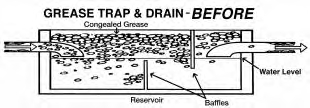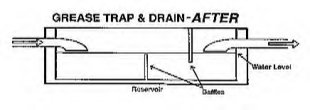Servicing local towns only:
Grease traps can be a major problem for restaurants when they are not pumped and cleaned on a regular basis. If you clean out the traps yourself, you know that it is a dirty smelly job that no one likes doing. Pumping and servicing the grease trap on a regular basis, will keep it operating properly. Sometimes when a grease pit is not pumped and checked on a regular basis grease can get into the main sewer line because of excess grease in the pit or the outlet baffle on a grease pit might be missing. If the blockage extends out into the city sewer lines, and is caused by grease emanating from your establishment, you will have to pay to have the problem remedied.
SILVESTER’S TO THE RESCUE!
PUMPING/CLEANING GREASE TRAPS
We also service exterior grease tanks.

Grease Trap Before

Grease Trap After
THE BASICS
Grease traps are a very important part of a kitchen’s waste water drainage system. Waste water from the dishwasher, sinks, and floor drains contain various amounts of grease and oils. This greasy waste passes down drain pipes that lead to the grease trap. The grease trap’s job is to slow the flow of water and allow it to cool inside the grease trap. As the water is slowed and cooled in the grease trap, greases and oils, being lighter than water, float to the top of the grease trap. As water flows through the outlet baffle of the grease trap, most of the oils and greases, are “trapped” in the grease trap.
Click here to view General Permit for the Discharge of Wastewater Associated with Food Preparation Establishments published by the State of Connecticut.
